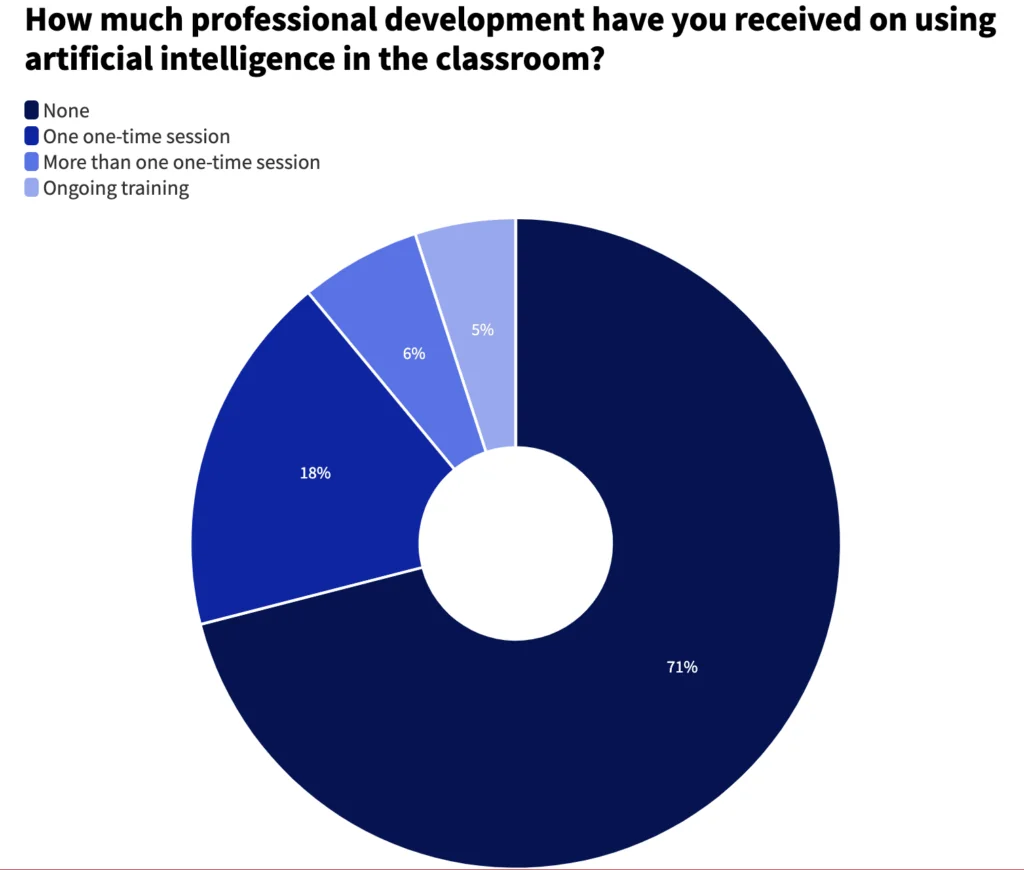A recent survey conducted by the EdWeek Research Center rings alarm bells regarding a significant gap in AI training for teachers, despite the growing importance (and use) of artificial intelligence in education.

✅ AI Essay Writer ✅ AI Detector ✅ Plagchecker ✅ Paraphraser
✅ Summarizer ✅ Citation Generator
Key Takeaways:
- Over 70% of teachers report not receiving any professional development on AI usage in classrooms.
- Teachers in urban districts and those teaching elementary grades are even less likely to have received AI training.
- Experts stress the need of AI training for teachers to responsibly use technology and guide students as smart AI consumers.
The Training Gap
Despite the increasing relevance of AI in education, many teachers find themselves without the necessary training. The lack of knowledge and support in using AI tools effectively restricts their ability to integrate this technology into their teaching, while students are using it non-stop.

Researchers decided to elaborate and discuss this topic further with several educators. Teachers like Justin Sealand from Woodford County High School express a desire for more specialized training. Sealand, who incorporates coding and data manipulation in his math classes, sees the potential of AI in enhancing content-specific teaching methods.
Tara Nattrass, from the International Society for Technology in Education, points out that school districts juggle multiple priorities, from reading sciences to social-emotional learning, making AI-specific training a challenge to prioritize.
“There are a lot of competing priorities when we look across school districts, and AI is one piece of that.”
With limited district-led training, some educators are exploring professional development opportunities elsewhere, such as ISTE’s AI courses and webinars, to stay ahead in the constantly changing world of education.
“More than 3,500 educators have signed up for ISTE’s professional learning course on AI,” according to the organization.
AI in Education – How Teachers Use It
It comes as no surprise that educators are already using AI in various ways to improve teaching and learning. After all, it’s there to use, and many students have already started integrating it in their learning (sometimes, not very responsibly). For example, some educators use AI-powered platforms that provide personalized learning experiences. Such platforms can adapt to each student’s pace and style and propose certain recommendations for future lessons.
Using AI usually implies eliminating boring and/or time-consuming tasks, and an educator’s job has no shortage of this. Grading assignments, quizzes, creating exercises, or even analyzing student works – all of that can be easily done thanks to artificial intelligence. Let’s not forget the true nightmare of every student – plagiarism checkers. Such tools have been in practice for a very long time and they are also based on AI. So, teachers are already taking a huge step closer to a more common usage of AI in education, and we are more than certain the number will increase.
This may sound extremely corny, but AI does have the potential to reshape education further. Such tools can become great assistants to professors all around the globe and help them with writing the curriculum, lesson plans, simplifying otherwise hard-to-grasp concepts in order to present them to students. Moreover, AI provides support with creative ideas not only in teaching itself, but also with transforming the classroom to be a more comfortable, stimulating setting, especially for elementary school.
However, there is one big ‘but.’ As AI continues to evolve, teachers need to adapt and learn how to integrate these new tools into their teaching effectively, not just try to push a button and sit there waiting for a perfect lesson plan. Schools and universities absolutely have to provide some sort of AI training for that; otherwise, how will teachers be able to explain it to their pupils, if they themselves don’t how to use it? They can’t pull their knowledge out of thin air.
What Should Institutions Do to Improve AI Training for Educators?
To properly design AI training for educators, institutions need to develop detailed programs that cater to the specific needs of teachers at different educational levels. It is kind of obvious that teaching kids and almost legal adults is quite different, hence the kids’ level and their learning objectives. So, how can it be divided?
For elementary school teachers, the focus should be on introducing AI concepts in a simple and engaging way, like integrating them into basic subjects like math and language arts. Middle school teachers should receive training that helps them incorporate AI into more advanced subjects, such as science and social studies, with a focus on practical applications. This can include analyzing documents, summarizing, creating different types of output (for example, table charts) and so on. High school teachers will probably have the most on their plate. This level of training requires a deeper understanding of AI, not only to be used during classes, but also being able to recognize whether the student work itself was messed with.
Where to start, you ask? Institutions should collaborate with AI experts to design curriculum for said trainings that is relevant and up-to-date. They should also provide teachers with access to AI tools and resources during it, prompting them to experiment and practice. And finally, ongoing support and professional development opportunities is vital to help teachers stay current with AI advancements, incorporate them into their teaching, and have the technical support they might need.
This way, institutions can make sure that teachers are well-equipped to educate students with and about AI, preparing them for a future where such tools play a significant role in everyday lives.
Follow us on Reddit for more insights and updates.





Comments (0)
Welcome to A*Help comments!
We’re all about debate and discussion at A*Help.
We value the diverse opinions of users, so you may find points of view that you don’t agree with. And that’s cool. However, there are certain things we’re not OK with: attempts to manipulate our data in any way, for example, or the posting of discriminative, offensive, hateful, or disparaging material.